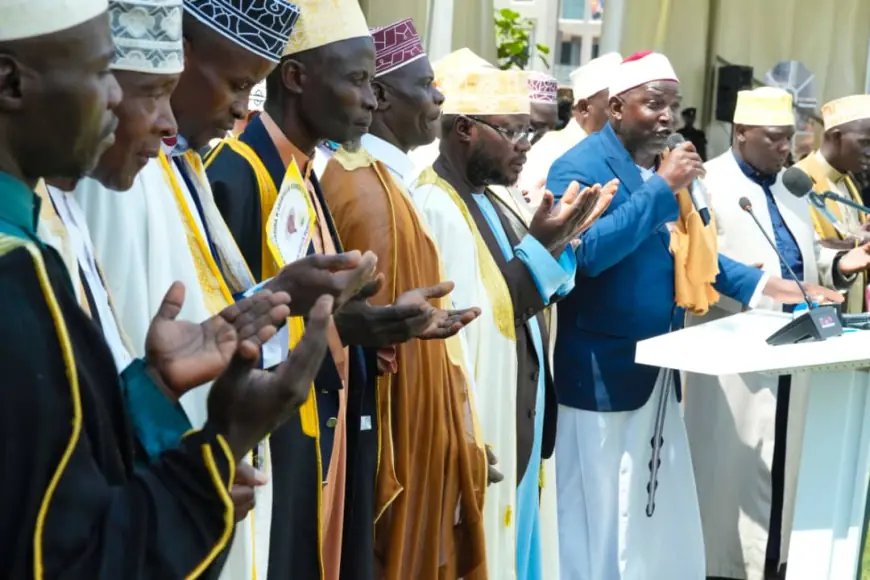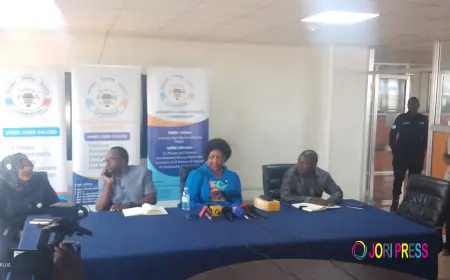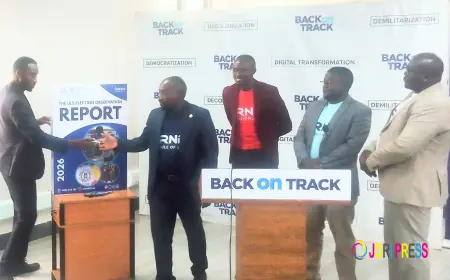Museveni Launches Shs 58 Billion Lwattamu House Project, Vows Stronger Support for Buganda Clan Leaders

President Yoweri Kaguta Museveni on Friday, July 25, 2025, officially launched the construction of Lwattamu House—a monumental six-storey complex that will serve as the traditional headquarters (Embuga y’Abataka) for clan leaders (Bataka) in Buganda. The project, located on 2.7 acres of prime land in Mengo near the Lubiri, symbolizes a renewed partnership between the central government and cultural institutions.
The Lwattamu House project is spearheaded by the Bataka of Buganda and is designed to strengthen cultural heritage while also serving economic purposes. The Shs 58 billion facility will feature 52 offices for clan heads, business and banking halls, a museum, conference facilities, and lodging spaces. Completion is expected within three years. President Museveni reaffirmed his commitment by pledging full financial support and assigning the UPDF Construction Brigade to execute the works. “I’m very happy to support the Bataka. We shall mobilize the Shs 58 billion needed and ensure the work is done,” he said.
The land on which the project will stand was purchased by the President for Shs 9.7 billion, fulfilling a promise he made during a June 2024 meeting with the Bataka at State House, Entebbe. Museveni emphasized that the project reflects the government's broader aim of using culture as a tool for national unity and development.
Reflecting on his historical relationship with the Buganda Kingdom, President Museveni recounted meeting Kabaka Ronald Muwenda Mutebi in London in 1981 during a visit to Libya. “I told him there was no problem as long as we were clear on roles between the new forces and traditionalists,” Museveni said. He also highlighted his efforts during the liberation struggle to preserve traditional institutions, recalling that he persuaded the National Resistance Army council in Gulu to recognize and respect cultural structures.
Museveni cited key traditional figures who supported the liberation movement, such as Kezrone Ssonko in Luwero, Balangira, and Bambejja. He also remembered visiting royal figures like Omumbejja Nalinya Ndagire in Lubaga and Omulangira Badru Kakungulu in Kibuli before going to the bush. The President criticized the colonial-era 1900 Buganda Agreement, saying it marginalized the Bataka, and emphasized the need to reintegrate them into Uganda’s cultural systems, especially after the restoration of kingdoms in the 1990s.
The President commended Hon. Joyce Nabbosa Ssebugwawo, the State Minister for ICT, for championing the cause of the Bataka. He cited leaders like Omutaka Kibaale Nadduli, Omutaka Namuguzi, and Omutaka Kaita as essential figures in preserving cultural identity. “Whether or not there are kings, clan leaders are the bedrock of tradition—as seen in regions like Karamoja and Ankole,” he noted.
He stressed the importance of clan structures in maintaining cultural identity and promoting genetic diversity through inter-clan marriages. “Our strength lies in our culture and genetics. While the government builds infrastructure, clan leaders safeguard our languages and heritage,” Museveni remarked.
To further empower the Bataka, President Museveni announced several support initiatives: a Shs 100 million donation to the Bataka Mutindo SACCO, which has over 700 members; Shs 22 million for a retreat for Balangira and Bambejja; and a commitment to purchase land in Nakasongola for a Bataka-led goat farming project. He also promised to send a team to assess renovation needs at the Masiro (ancestral tombs) in Wakiso and to provide a vehicle for the Bataka.
“I’m proud to see hardworking Abalangira—I, too, am a Mulangira Ssewava—but I work. We must use our culture to unite and develop, not to divide,” he emphasized.
Omutaka Kyaddondo Kasirye Mbag’elamula, head of the Nvuma clan, thanked President Museveni for what he described as unprecedented support. “No President has directly supported us like you have. Your purchase of the Mengo land and commitment to Lwattamu House will be remembered for generations,” he said, also acknowledging the earlier Shs 200 million support to the Bataka SACCO.
The event was attended by high-ranking government and cultural leaders, including Hon. Babirye Milly Babalanda (Minister for the Presidency), Hajat Minsa Kabanda (Minister for Kampala and Metropolitan Affairs), Hon. Judith Nabakooba (Minister for Lands, Housing and Urban Development), Eng. J.B. Walusimbi (former Katikkiro of Buganda), Eng. Dr. Fred Kateregga (Deputy Ssaabalangira), Princess Ndege Teyeggala Hawa, and several clan heads. To Read More, TapPRESIDENT MUSEVENI BREAKS GROUND FOR SHS 58 BILLION LWATTAMU HOUSE, COMMITS MORE SUPPORT TO THE BATAKA OF BUGANDAPresident Yoweri Kaguta Museveni on Friday, July 25, 2025, officiated at the groundbreaking ceremony for the construction of Lwattamu House, a landmark six-storey building that will serve as the Embuga y’Abataka (traditional headquarters for clan leaders) at Mengo in Kampala.The monumental project, which is spearheaded by the Bataka (clan heads) of Buganda, is part of a broader initiative to support cultural institutions and foster national unity.The 6-floor complex will be constructed on 2.7 acres of prime land near the Lubiri in Mengo, which the President purchased for Shs 9.7 billion as part of a pledge made during a June 8, 2024, meeting with the Bataka at State House, Entebbe.The building will house 52 offices for clan leaders, business and banking halls, a museum, conference rooms, and lodging facilities, among other income-generating initiatives. Completion is expected within three years.“Therefore, I’m very happy to support Bataka,” said President Museveni. “We shall organize the Shs 58 billion needed for the construction of Lwattamu House, and I will send the UPDF Construction Brigade to carry out the work,” he added.President Museveni also recalled his decades-long relationship with the Buganda Kingdom, tracing it back to 1981 when he met Kabaka Ronald Muwenda Mutebi in London.“As you know, I’m very much part of this system here,” Museveni said.“I met my young brother, Kabaka Mutebi, in London in 1981 while on a mission to see Gaddafi. I told him then that I saw no problem if we’re clear on who can do what between us—the new forces—and the traditionalists,” President Museveni said.He recounted his advocacy for traditional institutions, even during the liberation struggle, recalling how he persuaded the National Resistance Army’s council in Gulu to embrace cultural structures rather than oppose them.“When we were fighting against Idi Amin and Obote, there were Bataka who stood with us, such as Kezrone Ssonko in Luwero, the Balangira, and the Bambejja. Before I went to the bush, I visited Omumbejja Nalinya Ndagire in Lubaga and Omulangira Badru Kakungulu in Kibuli,” H.E. Museveni recalled.The President reflected on the 1900 Buganda Agreement and how the Bataka were marginalized by colonial policies. He emphasized that restoring kingdoms in the 1990s should have gone hand-in-hand with reintegrating clan leadership into the cultural fabric of Uganda.President Museveni praised Hon. Joyce Nabbosa Ssebugwawo, the Minister of State for ICT, for her instrumental role in bridging the gap between Bataka and the central government.“My sister, Nabbosa Ssebugwawo, came and talked about the Bataka—people like Omutaka Kibaale Nadduli, Omutaka Namuguzi, and Omutaka Kaita—whom I’ve known well. The clan leaders are the bedrock of tradition, whether or not you have kings. Like in Karamoja and Ankole, there are no kings, but clan heads are active,” he noted.He went on to stress the enduring value of clan systems, both in maintaining cultural identity and promoting genetic diversity through inter-clan marriages.“Part of our strength as Africans is our culture and our genetics. Clan structures discourage inbreeding and promote diversity. While the government builds roads and electricity, who is preserving our genetics and languages? Clan leaders play that vital role,” he said.Development support for Bataka and cultural projects:President Museveni pledged a series of financial and logistical support initiatives aimed at empowering the Bataka: these included Shs 58 billion for the construction of Lwattamu House, a Shs 100 million donation to the Bataka Mutindo SACCO (with over 700 members), and a Shs 22 million cash donation to support a retreat for Balangira and Bambejja.The President also promised to buy land for Bataka to establish a goat farming project in Nakasongola district.“I’m happy to see Abalangira abakozi because I’m also a Mulangira Ssewava—but I’m also working. We must use culture, not for exclusion, but as a force of unity, identity, and development,” he said.He also promised to send an inspection team to assess what is needed to renovate the Masiro (ancestral tombs) in Wakiso and to provide a means of transport for the Bataka.The head of the Nvuma clan, Omutaka Kyaddondo Kasirye Mbag’elamula, expressed deep gratitude to the President for what he described as unprecedented direct support to the Bataka.“No President has ever supported us directly apart from you. Your purchase of land at Mengo and backing for the Lwattamu House project is historic. This will be remembered by generations,” said Kasirye.He also thanked President Museveni for the Shs 200 million previously donated to the Bataka SACCO.The ceremony was attended by several top government officials and cultural leaders, including Hon. Babirye Milly Babalanda (Minister for Presidency), Hajat Minsa Kabanda (Minister for Kampala Capital City and Metropolitan Affairs), and Hon. Judith Nabakooba (Minister for Lands, Housing and Urban Development).Others were Eng. J.B. Walusimbi (former Katikkiro of Buganda), Eng. Dr. Fred Kateregga (Deputy Ssaabalangira), Princess Ndege Teyeggala Hawa and various clan heads. PRESIDENT MUSEVENI BREAKS GROUND FOR SHS 58 BILLION LWATTAMU HOUSE, COMMITS MORE SUPPORT TO THE BATAKA OF BUGANDAPresident Yoweri Kaguta Museveni on Friday, July 25, 2025, officiated at the groundbreaking ceremony for the construction of Lwattamu House, a landmark six-storey building that will serve as the Embuga y’Abataka (traditional headquarters for clan leaders) at Mengo in Kampala.The monumental project, which is spearheaded by the Bataka (clan heads) of Buganda, is part of a broader initiative to support cultural institutions and foster national unity.The 6-floor complex will be constructed on 2.7 acres of prime land near the Lubiri in Mengo, which the President purchased for Shs 9.7 billion as part of a pledge made during a June 8, 2024, meeting with the Bataka at State House, Entebbe.The building will house 52 offices for clan leaders, business and banking halls, a museum, conference rooms, and lodging facilities, among other income-generating initiatives. Completion is expected within three years.“Therefore, I’m very happy to support Bataka,” said President Museveni. “We shall organize the Shs 58 billion needed for the construction of Lwattamu House, and I will send the UPDF Construction Brigade to carry out the work,” he added.President Museveni also recalled his decades-long relationship with the Buganda Kingdom, tracing it back to 1981 when he met Kabaka Ronald Muwenda Mutebi in London.“As you know, I’m very much part of this system here,” Museveni said.“I met my young brother, Kabaka Mutebi, in London in 1981 while on a mission to see Gaddafi. I told him then that I saw no problem if we’re clear on who can do what between us—the new forces—and the traditionalists,” President Museveni said.He recounted his advocacy for traditional institutions, even during the liberation struggle, recalling how he persuaded the National Resistance Army’s council in Gulu to embrace cultural structures rather than oppose them.“When we were fighting against Idi Amin and Obote, there were Bataka who stood with us, such as Kezrone Ssonko in Luwero, the Balangira, and the Bambejja. Before I went to the bush, I visited Omumbejja Nalinya Ndagire in Lubaga and Omulangira Badru Kakungulu in Kibuli,” H.E. Museveni recalled.The President reflected on the 1900 Buganda Agreement and how the Bataka were marginalized by colonial policies. He emphasized that restoring kingdoms in the 1990s should have gone hand-in-hand with reintegrating clan leadership into the cultural fabric of Uganda.President Museveni praised Hon. Joyce Nabbosa Ssebugwawo, the Minister of State for ICT, for her instrumental role in bridging the gap between Bataka and the central government.“My sister, Nabbosa Ssebugwawo, came and talked about the Bataka—people like Omutaka Kibaale Nadduli, Omutaka Namuguzi, and Omutaka Kaita—whom I’ve known well. The clan leaders are the bedrock of tradition, whether or not you have kings. Like in Karamoja and Ankole, there are no kings, but clan heads are active,” he noted.He went on to stress the enduring value of clan systems, both in maintaining cultural identity and promoting genetic diversity through inter-clan marriages.“Part of our strength as Africans is our culture and our genetics. Clan structures discourage inbreeding and promote diversity. While the government builds roads and electricity, who is preserving our genetics and languages? Clan leaders play that vital role,” he said.Development support for Bataka and cultural projects:President Museveni pledged a series of financial and logistical support initiatives aimed at empowering the Bataka: these included Shs 58 billion for the construction of Lwattamu House, a Shs 100 million donation to the Bataka Mutindo SACCO (with over 700 members), and a Shs 22 million cash donation to support a retreat for Balangira and Bambejja.The President also promised to buy land for Bataka to establish a goat farming project in Nakasongola district.“I’m happy to see Abalangira abakozi because I’m also a Mulangira Ssewava—but I’m also working. We must use culture, not for exclusion, but as a force of unity, identity, and development,” he said.He also promised to send an inspection team to assess what is needed to renovate the Masiro (ancestral tombs) in Wakiso and to provide a means of transport for the Bataka.The head of the Nvuma clan, Omutaka Kyaddondo Kasirye Mbag’elamula, expressed deep gratitude to the President for what he described as unprecedented direct support to the Bataka.“No President has ever supported us directly apart from you. Your purchase of land at Mengo and backing for the Lwattamu House project is historic. This will be remembered by generations,” said Kasirye.He also thanked President Museveni for the Shs 200 million previously donated to the Bataka SACCO.The ceremony was attended by several top government officials and cultural leaders, including Hon. Babirye Milly Babalanda (Minister for Presidency), Hajat Minsa Kabanda (Minister for Kampala Capital City and Metropolitan Affairs), and Hon. Judith Nabakooba (Minister for Lands, Housing and Urban Development).Others were Eng. J.B. Walusimbi (former Katikkiro of Buganda), Eng. Dr. Fred Kateregga (Deputy Ssaabalangira), Princess Ndege Teyeggala Hawa and various clan heads. PRESIDENT MUSEVENI BREAKS GROUND FOR SHS 58 BILLION LWATTAMU HOUSE, COMMITS MORE SUPPORT TO THE BATAKA OF BUGANDAPresident Yoweri Kaguta Museveni on Friday, July 25, 2025, officiated at the groundbreaking ceremony for the construction of Lwattamu House, a landmark six-storey building that will serve as the Embuga y’Abataka (traditional headquarters for clan leaders) at Mengo in Kampala.The monumental project, which is spearheaded by the Bataka (clan heads) of Buganda, is part of a broader initiative to support cultural institutions and foster national unity.The 6-floor complex will be constructed on 2.7 acres of prime land near the Lubiri in Mengo, which the President purchased for Shs 9.7 billion as part of a pledge made during a June 8, 2024, meeting with the Bataka at State House, Entebbe.The building will house 52 offices for clan leaders, business and banking halls, a museum, conference rooms, and lodging facilities, among other income-generating initiatives. Completion is expected within three years.“Therefore, I’m very happy to support Bataka,” said President Museveni. “We shall organize the Shs 58 billion needed for the construction of Lwattamu House, and I will send the UPDF Construction Brigade to carry out the work,” he added.President Museveni also recalled his decades-long relationship with the Buganda Kingdom, tracing it back to 1981 when he met Kabaka Ronald Muwenda Mutebi in London.“As you know, I’m very much part of this system here,” Museveni said.“I met my young brother, Kabaka Mutebi, in London in 1981 while on a mission to see Gaddafi. I told him then that I saw no problem if we’re clear on who can do what between us—the new forces—and the traditionalists,” President Museveni said.He recounted his advocacy for traditional institutions, even during the liberation struggle, recalling how he persuaded the National Resistance Army’s council in Gulu to embrace cultural structures rather than oppose them.“When we were fighting against Idi Amin and Obote, there were Bataka who stood with us, such as Kezrone Ssonko in Luwero, the Balangira, and the Bambejja. Before I went to the bush, I visited Omumbejja Nalinya Ndagire in Lubaga and Omulangira Badru Kakungulu in Kibuli,” H.E. Museveni recalled.The President reflected on the 1900 Buganda Agreement and how the Bataka were marginalized by colonial policies. He emphasized that restoring kingdoms in the 1990s should have gone hand-in-hand with reintegrating clan leadership into the cultural fabric of Uganda.President Museveni praised Hon. Joyce Nabbosa Ssebugwawo, the Minister of State for ICT, for her instrumental role in bridging the gap between Bataka and the central government.“My sister, Nabbosa Ssebugwawo, came and talked about the Bataka—people like Omutaka Kibaale Nadduli, Omutaka Namuguzi, and Omutaka Kaita—whom I’ve known well. The clan leaders are the bedrock of tradition, whether or not you have kings. Like in Karamoja and Ankole, there are no kings, but clan heads are active,” he noted.He went on to stress the enduring value of clan systems, both in maintaining cultural identity and promoting genetic diversity through inter-clan marriages.“Part of our strength as Africans is our culture and our genetics. Clan structures discourage inbreeding and promote diversity. While the government builds roads and electricity, who is preserving our genetics and languages? Clan leaders play that vital role,” he said.Development support for Bataka and cultural projects:President Museveni pledged a series of financial and logistical support initiatives aimed at empowering the Bataka: these included Shs 58 billion for the construction of Lwattamu House, a Shs 100 million donation to the Bataka Mutindo SACCO (with over 700 members), and a Shs 22 million cash donation to support a retreat for Balangira and Bambejja.The President also promised to buy land for Bataka to establish a goat farming project in Nakasongola district.“I’m happy to see Abalangira abakozi because I’m also a Mulangira Ssewava—but I’m also working. We must use culture, not for exclusion, but as a force of unity, identity, and development,” he said.He also promised to send an inspection team to assess what is needed to renovate the Masiro (ancestral tombs) in Wakiso and to provide a means of transport for the Bataka.The head of the Nvuma clan, Omutaka Kyaddondo Kasirye Mbag’elamula, expressed deep gratitude to the President for what he described as unprecedented direct support to the Bataka.“No President has ever supported us directly apart from you. Your purchase of land at Mengo and backing for the Lwattamu House project is historic. This will be remembered by generations,” said Kasirye.He also thanked President Museveni for the Shs 200 million previously donated to the Bataka SACCO.The ceremony was attended by several top government officials and cultural leaders, including Hon. Babirye Milly Babalanda (Minister for Presidency), Hajat Minsa Kabanda (Minister for Kampala Capital City and Metropolitan Affairs), and Hon. Judith Nabakooba (Minister for Lands, Housing and Urban Development).Others were Eng. J.B. Walusimbi (former Katikkiro of Buganda), Eng. Dr. Fred Kateregga (Deputy Ssaabalangira), Princess Ndege Teyeggala Hawa and various clan heads. PRESIDENT MUSEVENI BREAKS GROUND FOR SHS 58 BILLION LWATTAMU HOUSE, COMMITS MORE SUPPORT TO THE BATAKA OF BUGANDAPresident Yoweri Kaguta Museveni on Friday, July 25, 2025, officiated at the groundbreaking ceremony for the construction of Lwattamu House, a landmark six-storey building that will serve as the Embuga y’Abataka (traditional headquarters for clan leaders) at Mengo in Kampala.The monumental project, which is spearheaded by the Bataka (clan heads) of Buganda, is part of a broader initiative to support cultural institutions and foster national unity.The 6-floor complex will be constructed on 2.7 acres of prime land near the Lubiri in Mengo, which the President purchased for Shs 9.7 billion as part of a pledge made during a June 8, 2024, meeting with the Bataka at State House, Entebbe.The building will house 52 offices for clan leaders, business and banking halls, a museum, conference rooms, and lodging facilities, among other income-generating initiatives. Completion is expected within three years.“Therefore, I’m very happy to support Bataka,” said President Museveni. “We shall organize the Shs 58 billion needed for the construction of Lwattamu House, and I will send the UPDF Construction Brigade to carry out the work,” he added.President Museveni also recalled his decades-long relationship with the Buganda Kingdom, tracing it back to 1981 when he met Kabaka Ronald Muwenda Mutebi in London.“As you know, I’m very much part of this system here,” Museveni said.“I met my young brother, Kabaka Mutebi, in London in 1981 while on a mission to see Gaddafi. I told him then that I saw no problem if we’re clear on who can do what between us—the new forces—and the traditionalists,” President Museveni said.He recounted his advocacy for traditional institutions, even during the liberation struggle, recalling how he persuaded the National Resistance Army’s council in Gulu to embrace cultural structures rather than oppose them.“When we were fighting against Idi Amin and Obote, there were Bataka who stood with us, such as Kezrone Ssonko in Luwero, the Balangira, and the Bambejja. Before I went to the bush, I visited Omumbejja Nalinya Ndagire in Lubaga and Omulangira Badru Kakungulu in Kibuli,” H.E. Museveni recalled.The President reflected on the 1900 Buganda Agreement and how the Bataka were marginalized by colonial policies. He emphasized that restoring kingdoms in the 1990s should have gone hand-in-hand with reintegrating clan leadership into the cultural fabric of Uganda.President Museveni praised Hon. Joyce Nabbosa Ssebugwawo, the Minister of State for ICT, for her instrumental role in bridging the gap between Bataka and the central government.“My sister, Nabbosa Ssebugwawo, came and talked about the Bataka—people like Omutaka Kibaale Nadduli, Omutaka Namuguzi, and Omutaka Kaita—whom I’ve known well. The clan leaders are the bedrock of tradition, whether or not you have kings. Like in Karamoja and Ankole, there are no kings, but clan heads are active,” he noted.He went on to stress the enduring value of clan systems, both in maintaining cultural identity and promoting genetic diversity through inter-clan marriages.“Part of our strength as Africans is our culture and our genetics. Clan structures discourage inbreeding and promote diversity. While the government builds roads and electricity, who is preserving our genetics and languages? Clan leaders play that vital role,” he said.Development support for Bataka and cultural projects:President Museveni pledged a series of financial and logistical support initiatives aimed at empowering the Bataka: these included Shs 58 billion for the construction of Lwattamu House, a Shs 100 million donation to the Bataka Mutindo SACCO (with over 700 members), and a Shs 22 million cash donation to support a retreat for Balangira and Bambejja.The President also promised to buy land for Bataka to establish a goat farming project in Nakasongola district.“I’m happy to see Abalangira abakozi because I’m also a Mulangira Ssewava—but I’m also working. We must use culture, not for exclusion, but as a force of unity, identity, and development,” he said.He also promised to send an inspection team to assess what is needed to renovate the Masiro (ancestral tombs) in Wakiso and to provide a means of transport for the Bataka.The head of the Nvuma clan, Omutaka Kyaddondo Kasirye Mbag’elamula, expressed deep gratitude to the President for what he described as unprecedented direct support to the Bataka.“No President has ever supported us directly apart from you. Your purchase of land at Mengo and backing for the Lwattamu House project is historic. This will be remembered by generations,” said Kasirye.He also thanked President Museveni for the Shs 200 million previously donated to the Bataka SACCO.The ceremony was attended by several top government officials and cultural leaders, including Hon. Babirye Milly Babalanda (Minister for Presidency), Hajat Minsa Kabanda (Minister for Kampala Capital City and Metropolitan Affairs), and Hon. Judith Nabakooba (Minister for Lands, Housing and Urban Development).Others were Eng. J.B. Walusimbi (former Katikkiro of Buganda), Eng. Dr. Fred Kateregga (Deputy Ssaabalangira), Princess Ndege Teyeggala Hawa and various clan heads.
What's Your Reaction?
 Like
0
Like
0
 Dislike
0
Dislike
0
 Love
0
Love
0
 Funny
0
Funny
0
 Angry
0
Angry
0
 Sad
0
Sad
0
 Wow
0
Wow
0















































